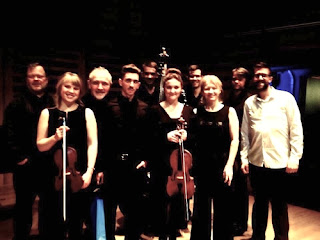 |
| Brodsky Quartet - Picture credit: Eric Richmond |
The program began with ‘Fantasia XIII in F - Upon one note’ arranged by Britten. Written towards the end of Henry Purcell’s life (1659-1695) this piece requires, in addition to the quartet, a steady C. But in fact the concert began before this – as the audience were settling down Clare Newton sashayed out of the side stall door with her viola and newspaper and proceeded to sit on the edge of the stage and read.
When the quartet was applauded on to the stage via the normal route, they all made an act of noticing Clare and wondering what she was doing there. All became apparent when they started to play – she was the missing C. Purcell was a master of heart-wrenching suspensions and in the right hands his music could have been written yesterday.
As always the Brodsky quartet played impeccably, making the most of the dissonance provided, and so provided a link between the Shakespeare (written 100 years earlier) and the contemporary styles in which ‘Il Sogno’ and the rest of the pieces in the concert were composed.
Iain Masson wrote ‘Three pieces for string quartet’ for the Brodsky quartet ten years ago when he was a composition student, Jacqueline Thomas explained. He was supposed to write for four instruments plus a voice, but failed to write the voice part. When asked to add it in he provided an unaccompanied recitative in front of each movement.
 |
| Iain Masson with the Brodsky Quartet and performers, taken at the concert on 9 November |
‘Monotony’, preceded with words such as “it was so boring”, was a quirky train-dance with some nice harmonic moments. The second movement ‘Passing by’ (“sat and daydreamed”) began in a wide dreamy way in the style of Vaughan-Williams, but was interrupted by bleating on the violin and ended in a poignant cello pizzicato. ‘Carriageways’ had some distinctly stormy rhythms to go with the words “laughing” and “exciting”.
Robert Davidson’s piece ‘Three men and a Blonde’ was also written about ten years ago (2010) for (and about) the Brodsky Quartet. Throughout there is a sampled phone interview with the members of the quartet, presumably with Davidson himself, which provides both a vocal part and a percussion element which, even though this is a recording, the performers interacted with. The composition is very cleverly done, each line is brought forward when that person is introduced or is talking – when Daniel was introduced the first violin part was very fancy indeed.
“Regret” by Dave Brubeck (1920 –2012) written in response to 9/11 for the Brodsky Quartet. Made more poignant by Brubeck’s recent death and the closeness to Remembrance Sunday, the cinematic style tied in with the Masson and Purcell. It begins with Dowland-like falling motifs, expanding into wider themes, before returning to falling and a layering from the bottom up. This is wide expansive music facing big emotions.
In a 2012 interview on radio 4 the Brodsky Quartet talked about playing well known music for the people whom it is fresh and new, and I am often one of them. I do not know how I have missed hearing ‘Blues’ from Joseph-Maurice Ravel’s (1875 –1937) Violin Sonata No. 2 before, but it was fantastic. ‘Blues’ was written in 1923-27, but, with a tone pallet similar to George Gershwin, must have been groundbreaking. I heard strains of Summertime - composed some 10 years later by Gershwin, suggestions of folk dances used by Aaron Copland almost 20 years later, and hints of ‘Blues in the night’ which would not be written until 1941.
‘Overture on Hebrew Themes’ by Sergei Prokofiev (1891 –1953) showcased two more students, Jernej Albreht on clarinet and Teo Gheorghiu on piano. After a brief accelerando the catchy ‘un poco allegro’ theme was nicely balanced with the delightful meanderings of the ‘piu mosso’. The clarinet has more of a chance to shine than the piano, but as the variations progressed the piano got its own moments.
The final two students Flora Curzon on violin and Oliver Simpson on double bass joined everyone on stage for the final work, Elvis Costello’s ‘Il Sogno’. This arrangement was written by Robert Davidson for eight instruments but managed to keep the feeling of a larger orchestral sound by the inner parts moving around, sometimes playing their individual part and sometimes having floating allegiances with others. With slap and percussive bass, plus contemporary techniques alongside classical and cinematic ones ‘Il Sogno’ was both expressive and expansive.
A final Shostakovich waltz, arranged by Jacqui for the little band, brought the concert to a close.
Brodsky Quartet are Daniel Rowland (violin), Ian Belton (violin), Paul Cassidy (viola), and Jacqueline Thomas (cello). I’ll give the final words to Robert Davidson, “You guys are going to do well because you are three men and a blond”.
Elsewhere on this blog:
- WIN a copy of Music: The Definitive History our latest Competition
- Emmanuel Despax in concertos by Stephen Goss, Saint-Saens and Franck - CD review
- Ceremony and Devotion - The Sixteen at Temple Church
- BREMF: Profane Delirums - L'Avventura London
- Christiane Karg - Wigmore Hall Live - CD review
- Journeying Boys - Guildhall School
- Taking Music Further - Orchestras Live conference
- Giorgio Berrugi at Rosenblatt Recitals
- Handel's Israel in Egypt at the Royal Hospital
- Lily Afshar and the Collaborative Orchestra
- Sheer delight - Gallay horn trios and quartet - CD review
- Sweet indeed - Douce France - Anne Sofie von Otter - CD review
- Mesmerising and Magical - Breaking the Rules - BREMF
- Home











No comments:
Post a Comment